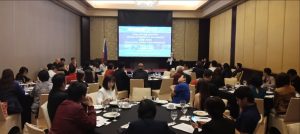 “Since the inception of the industry-government-academe linkage, there is now greater participation and partnerships between companies and universities in the implementation of this reform at ground level.” This was reported by Mr. Sergio R. Ortiz-Luis, Jr., president of the Philippine Exporters Confederation (PHILEXPORT) and Vice-Chair of the Export Development Council (EDC), during the recently concluded 8th National Education Forum.
“Since the inception of the industry-government-academe linkage, there is now greater participation and partnerships between companies and universities in the implementation of this reform at ground level.” This was reported by Mr. Sergio R. Ortiz-Luis, Jr., president of the Philippine Exporters Confederation (PHILEXPORT) and Vice-Chair of the Export Development Council (EDC), during the recently concluded 8th National Education Forum.
The industry leader cited both the BPO (Business Process Outsourcing) and the Electronics industries as models for industry-government-academe partnership. They have been adopting and implementing the said reform in order for them to address their jobs-skills mismatch and make their respective industries become more globally competitive.
To date, The BPO employs 1.3 million people last year and is expected to grow up to 1.7 billion within the year, while the electronics industry employs 3.2. million direct and indirect workers. In addition, both industries have established work immersion and internship programs as well as various industry-based programs that promote employment.
Ortiz-Luis, Jr, later explained that responding to the global realities and domestic demands would require a balance between what is being demanded by the labor market and what is being supplied by the education and training sector. He added that there is need to respond to the challenges posed by globalization, trade liberalization, information and technological advancement, international cooperation and agreements.
He continued that “globalization, includes among others, freer and borderless movement of capital goods, services, technology, information and human resource development between and among countries. Thus, the rapid change in information and communication technology directly impacts on the way work is being organized and executed, how products are being manufactured and shipped, and how systems and processes are implemented”.


 House Bill (HB) No. 8005 seeks to separate the regulatory and commercial functions of the Philippine Ports Authority (PPA) and create a new port agency called Philippine Ports Corporation (PHILPORTS) will focus on developing, managing, and operating public ports.
House Bill (HB) No. 8005 seeks to separate the regulatory and commercial functions of the Philippine Ports Authority (PPA) and create a new port agency called Philippine Ports Corporation (PHILPORTS) will focus on developing, managing, and operating public ports. “Since the inception of the industry-government-academe linkage, there is now greater participation and partnerships between companies and universities in the implementation of this reform at ground level.” This was reported by Mr. Sergio R. Ortiz-Luis, Jr., president of the Philippine Exporters Confederation (PHILEXPORT) and Vice-Chair of the Export Development Council (EDC), during the recently concluded 8th National Education Forum.
“Since the inception of the industry-government-academe linkage, there is now greater participation and partnerships between companies and universities in the implementation of this reform at ground level.” This was reported by Mr. Sergio R. Ortiz-Luis, Jr., president of the Philippine Exporters Confederation (PHILEXPORT) and Vice-Chair of the Export Development Council (EDC), during the recently concluded 8th National Education Forum.